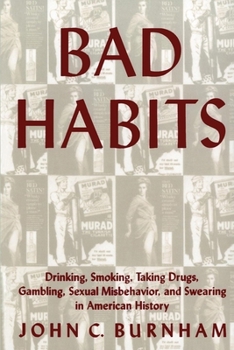Bad Habits: Drinking, Smoking, Taking Drugs, Gambling, Sexual Misbehavior and Swearing in American History
(Part of the The American Social Experience Series Series)
Select Format
Select Condition 
Book Overview
A pioneering study tracing the growth of Americans' bad habits
Format:Paperback
Language:English
ISBN:081471224X
ISBN13:9780814712245
Release Date:February 1994
Publisher:New York University Press
Length:378 Pages
Weight:1.45 lbs.
Dimensions:1.0" x 5.9" x 9.0"
Customer Reviews
1 rating
How Profits and "Lower-Order Parochialism" Changed America
Published by Thriftbooks.com User , 24 years ago
"Bad Habits" aims to change the way people think about the issues of personal freedom and social responsibility in America. John Burnham takes drinking, smoking, drugs, gambling, sexual misbehavior, and swearing, all traditionally considered "minor vices" and follows their path into acceptability and colossal profitability. As he states in his preface, he started out thinking he would have a nice laugh at how neo-Puritans can't stand to see other people have a little fun. But by the end of his research, he had stopped laughing.Burnham made one key decision: rather than focus on the reformers (and just assume that everyone "naturally" wants a drink or a smoke), he decided to focus on the anti-reformers. What was driving them? As he found, money, of course. Pressure for repeal or liberalization of laws and social mores against the "minor vices" starts with back-stage funding by those who sell both the item in question-brewers, casino owners, marijuana dealers, pornographers-and related items, from glass-bottle manufacturers to money launderers. This is not big news, although it's worth repeating that agitation for liberalization of drug laws, for example, has always been funded chiefly by drug traders and their financial allies. Moreover, as Burnham shows, legalization is only the first step. After all, if marijuana is legal and no one smokes it, then the investment in funding legalization organizations has been wasted. Not to worry: Burnham demonstrates that just as prohibition really does work in reducing the "bad habits," so too legalization and a good ad campaign really do increase the number of indulgers. Of course an ad campaign needs to be directed at the right audience. Just as tobacco executives do, pornographers, drug-dealers, and liquor merchants also know that their profits comes from heavy users and heavy users need to be started when they are young.But who would believe such obviously self-interested advocates? Here Burnham builds on social history to identify "lower-order parochialism" as a significant force advocating and celebrating the "bad habits." Formed in America's 19th century urban areas where minor-vice merchants, exemplified by the saloon-keeper, became intimately intertwined with the bachelor sub-culture, new immigrants, and the Bohemian scene, "lower-order parochialism" validated the "bad habits" as a positive act of rebellion against the dominant Yankee, middle-class, often evangelical, coalition who supported reform campaigns. In the barracks of World Wars I and II, this lower-order parochialism was able to break out of the urban red-light districts and make abstention seem deviant. Those who made money off the minor vices found an increasing public for their campaigns first to normalize and then to celebrate the minor vices. From the repeal of prohibition onwards, Burnham traces the process by which our mores are approximating those of the Victorian underworld.The minor vice





